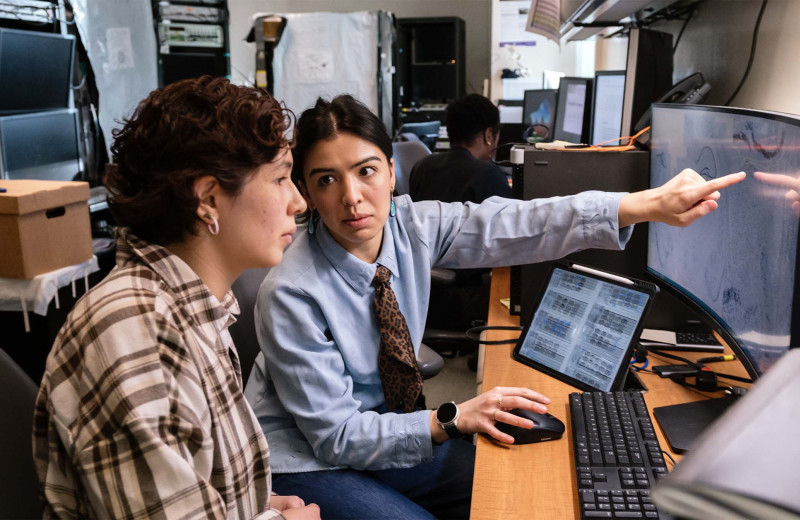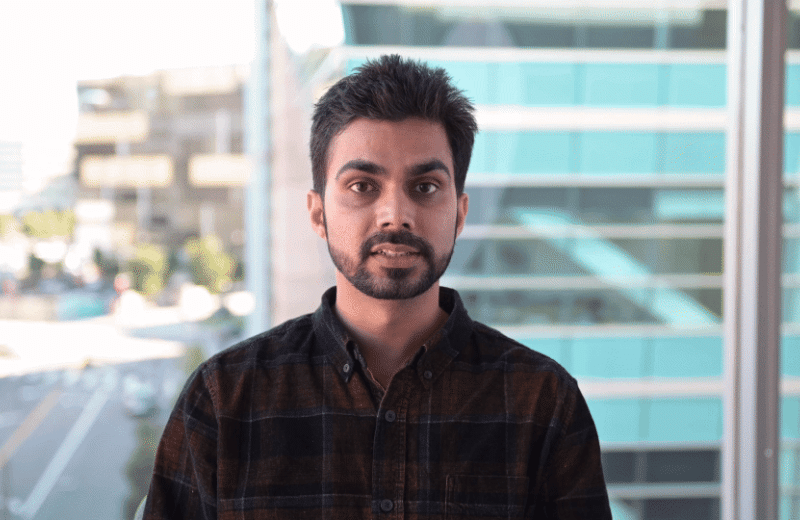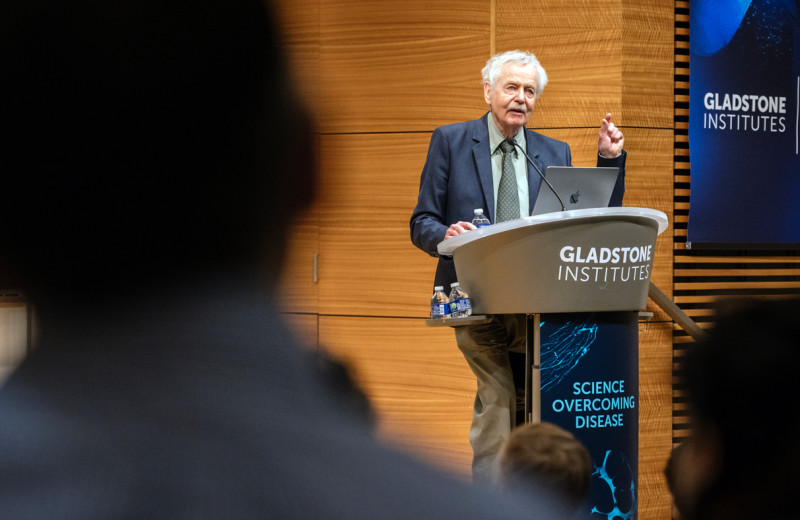Gladstone NOW: The Campaign Join Us on the Journey✕
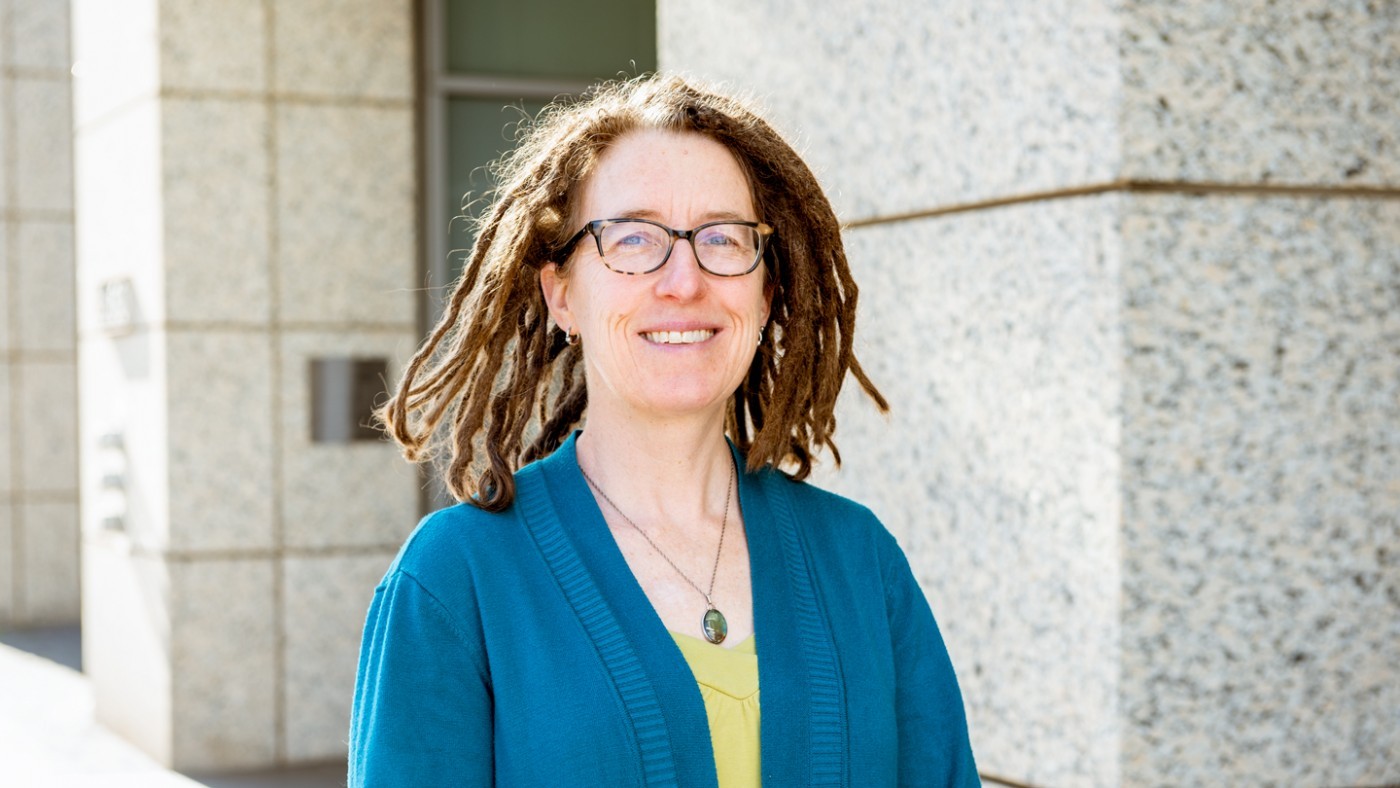
Katie Pollard, PhD, is the director of the Gladstone Institute of Data Science and Biotechnology.
Ada Lovelace Day was established in 2009 as a way to celebrate women, advocates, and educators in the science, technology, engineering, and mathematics (STEM) fields.
Ada Lovelace was born to Anne Isabella Noel Byron and Poet Lord Byron in 1815. From a young age, Ada had an aptitude for math. Through this interest, she was connected to Charles Babbage, who is considered the father of computers. They formed a long working relationship and friendship.
Babbage had proposed a general purpose computer called the Analytical Engine. While translating an article on the new machine, Lovelace provided her own notes and commentary. In her notes, she wrote what is considered to be the first computer algorithm, which has given Lovelace the title of the first computer programmer.
While computer programming started with a woman, the field of computer science has been predominantly dominated by men. The Bureau of Labor Statistics projects computer science jobs to grow by 19 percent by 2026, yet only 18 percent of those who earn a computer science bachelor’s degree are women.
In 2018, Gladstone Institutes launched the Gladstone Institute of Data Science and Biotechnology as a way to harness new technologies and the data they create within biomedical research. We interviewed the director of the institute, Katie Pollard, PhD, who was also the first female institute director at Gladstone, to discuss how she got her start in data science and how to make STEM a more inclusive environment for women.
How did you get your start in math?
I didn’t go into college planning to study math, but I took an advanced math class as a first-year and I had a professor who encouraged me to keep going with it. I wasn’t totally convinced, even though math seemed easier to me than it was for other people. I wasn’t motivated to spend my life doing math. So, I declared an anthropology major and signed up for another math class.
But two things convinced me to stick with it, and ultimately end up double majoring in math and anthropology.
The first was a summer program I took at UC Berkeley. The program allowed undergrads to take grad-level math classes, but it was designed as a program for just women—all female students, all female teaching assistants, and all female professors.
I had been a minority as a woman in math at my college, so to have these role models and meet other women who were interested in math was definitely a game changer for me. That really made a difference. I don’t think I would have stuck with math otherwise. (Two months in Berkeley also made me determined to move to the Bay Area.)
The second was that I also started realizing all the cool stuff you can do with math. It’s not just proving theorems or abstract concepts. I learned that I could apply math to the problems I was working on in anthropology.
What was it like to be a woman in your undergraduate math program?
I didn’t feel excluded explicitly by my peers, but I definitely felt like an outsider the whole time. There was one other woman in my year majoring in math. We became good friends and we actually formed an all-female punk rock band together.
We were kindred spirits and hung out with each other, but not so much with the rest of the math majors.
What got you into bioinformatics?
Bioinformatics didn’t exist as a field when I was in high school and undergrad, or even really in grad school. It certainly wasn’t a class or a major that you looked for. It was just starting to develop as a field.
I worked for several years before I went to grad school, mostly in public health. I ended up going into a biostatistics PhD program at UC Berkeley. At the time, computers were coming on the scene and I thought I was going to use math and computers to do epidemiological research.
Then, the human genome was sequenced and that was a career-changing moment for me. I got really excited about using computer science, statistics, and probability to compare genomes and study how DNA evolves and changes our biology.
Bioinformatics really started to develop as a field once we were able to generate more data. It was the technological developments that made molecular biology a much more interesting field to a computational person like me.
And when all this came together, it really unified my interest in evolution with my technical skills in math. The ability to understand fundamental biology and study human health had been interests of mine, my whole career. I had just never seen a way to bring them together until the late 1990s or early 2000s.
How has being a woman affected your career?
I think despite feeling like an outsider, or maybe because of it, I haven’t been afraid to move into different areas of science or bring my expertise from one field to another.
That “outsider” mentality made me feel like it wouldn’t be that weird to come to Gladstone as someone with a statistics PhD—even if my colleagues don’t understand what I studied, and I don’t understand everything that they’re experts in. Not a lot of people would make that career choice.
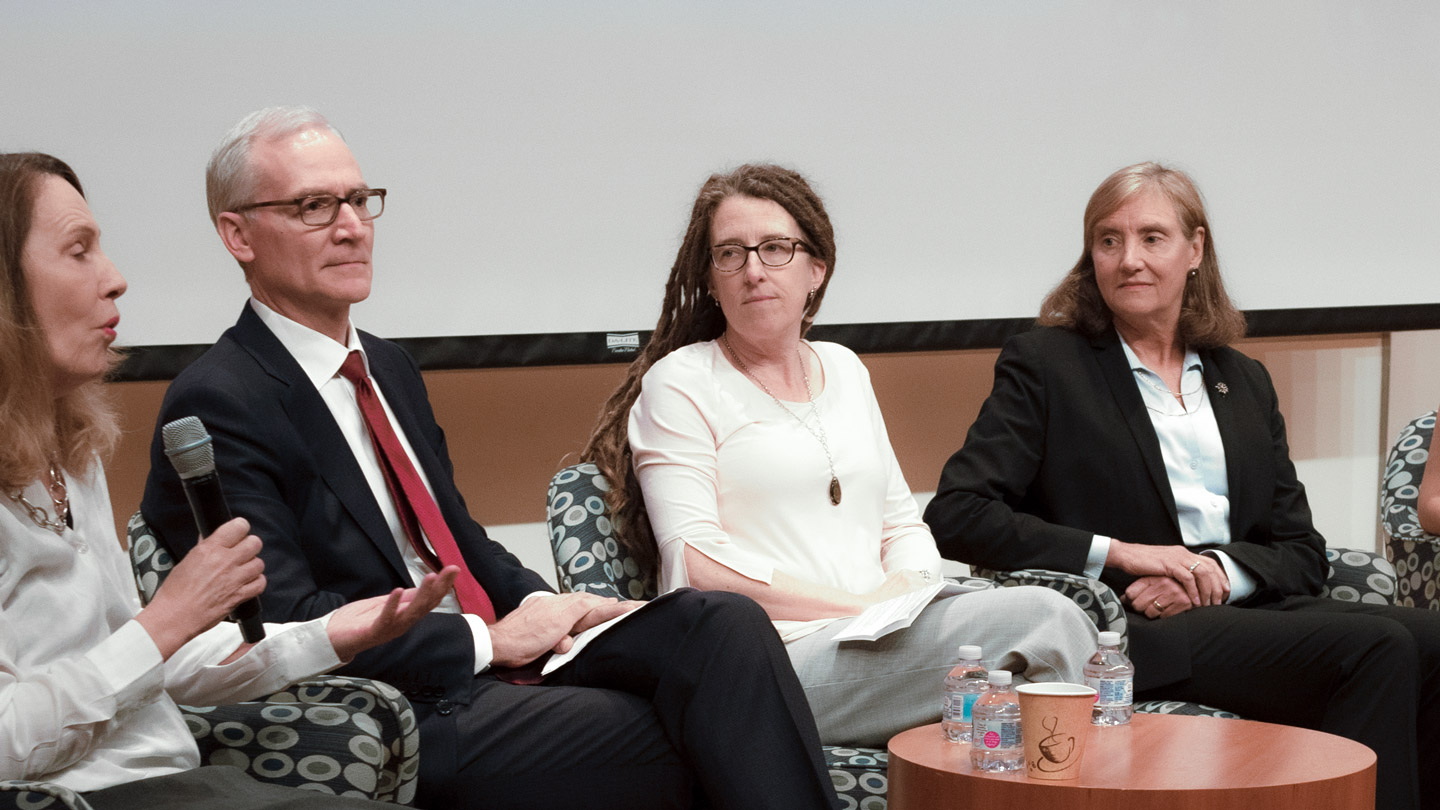
Katie Pollard (third from the left) speaking on a gender equity in the sciences panel during Gladstone's 40th Anniversary Science Symposium.
My past experiences made me used to being in scenarios where I’m part of an underrepresented group. This includes being a woman in science but also being a computational scientist at Gladstone, which is filled with biologists.
And I’m glad I did, because I get to fully focus on doing biomedical research as a statistician. That’s why I came to Gladstone, where research is the number one priority, rather than joining a traditional academic institution where I would only do research on the side while teaching 40 hours a week.
It sounds like you’ve been a bit of a rebel your whole life, from punk rock bands to being a data scientist at a biomedical research institute.
My mom is definitely a role model there. She’s a political activist and educator and has worked on a lot of nonpartisan political issues her whole life. I think some of my rebel or “fight the power” mentality comes from her.
What changes have you seen for women over the course of your career and what do you hope for the next generation?
One of the changes I’ve seen is that women in science are identifying more as women and supporting each other in this way. They’re forming groups, committees, and efforts—very successful ones too—to bring our community together and to advocate for the things we need.
One of the things that I’m hoping to do, as a leader at Gladstone, is to bring the issues that face women and other underrepresented groups in science, into everybody’s consciousness. To be as successful as possible, it shouldn’t just be women trying to help each other or themselves but all of Gladstone should be working together to be a more inclusive place that supports women and other non-center groups.
Do women in data science face different challenges than women in other scientific fields?
Across all fields of science, women are increasingly underrepresented compared to men as you move through career stages. Representation is pretty equal at the undergrad level in biology, but by the time you get to full professors, you have very few women left.
In data science, it’s still very unbalanced through the entire career track. This has certainly changed since I was an undergrad though, which is good. Many more women are going into data science than before. But the number of women in early-career stages is still much lower than other fields, like biology.
I think a contributing factor are the gender stereotypes in our society that are enforced by parents, teachers, neighbors, and friends, which affect a woman’s view of her ability to be a computational thinker starting at a young age.
A burden is often placed on women to create an environment of inclusion. What are the steps that everyone, especially men, can take to create a more inclusive environment and support women in the sciences?
Each of us can take individual action, but our institutions also need to change.
As an ally, I think the number one thing you should do on a personal level is ask your female colleagues, “How does this feel to you? What do you think?”, then genuinely listen to the answers and try to be responsive. That sounds pretty straightforward, but when you make decisions without asking the question “How might this impact a woman in science?”, you put an unfair burden on women to speak up when they see a problem, rather than being inclusive in your approach.
And in many circumstances, a woman may feel like it’s not safe to speak up. So important issues never get addressed.
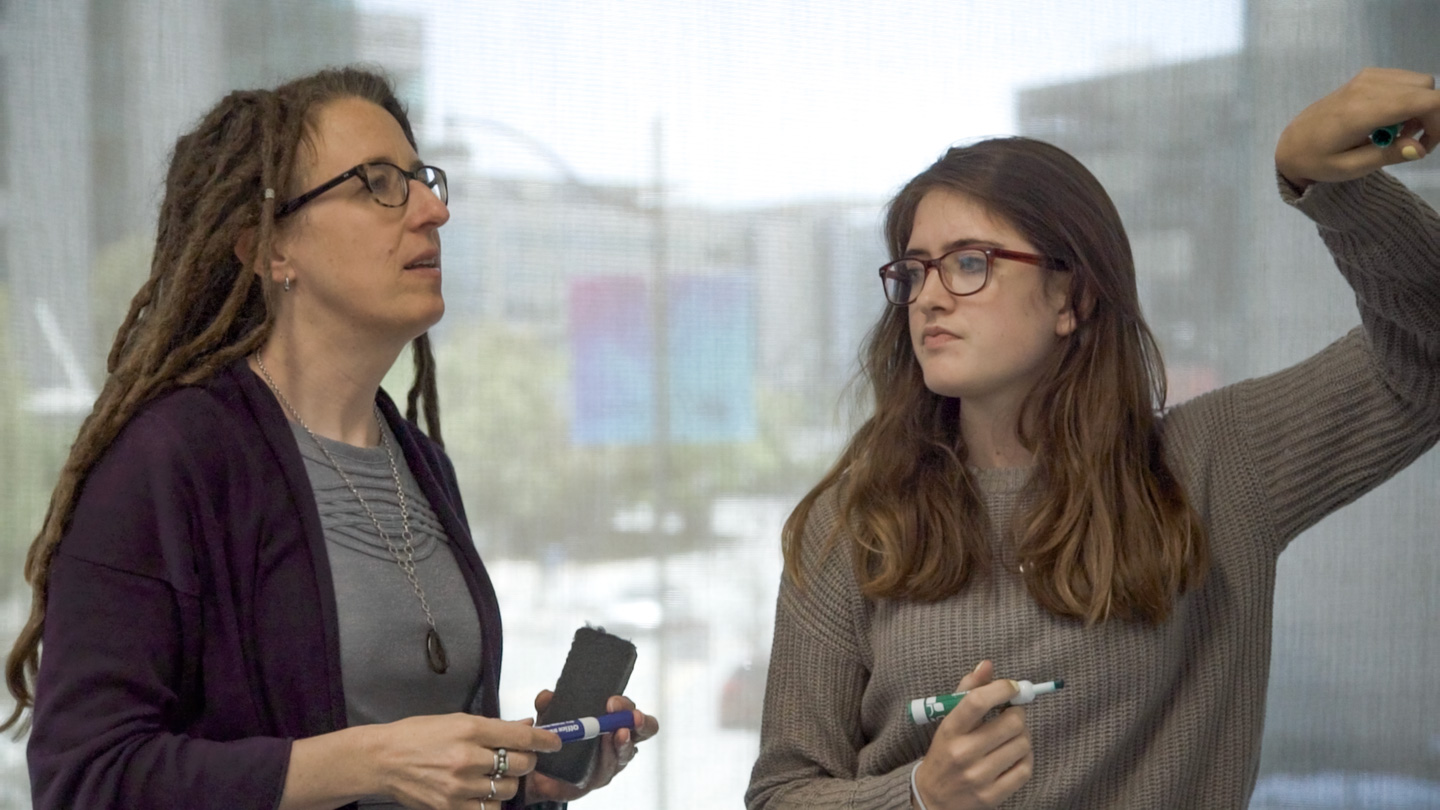
On an institutional level, we should start looking at all policies, or current practices, and ask whether or not they’re inclusive. That can mean HR policies, but also things like when we decide to schedule meetings and whether that may place an added burden on a parent.
Right now, during the COVID-19 pandemic, many people, both men and women, are dealing with the lack of childcare while trying to work from home—myself included. This is a financial issue, because the limited childcare that is available now is expensive. It’s also a career-advancement issue, especially if you’re early in your career. If you have big childcare responsibilities, it can totally derail your career progression.
It took some time, but I think we’re moving in the right direction at Gladstone. We’ve created a new committee to identify how different groups at Gladstone are being impacted, particularly trainees and caregivers. This way, we can identify if we need to raise money or change certain policies to support our people.
Overall, organizations need to be much more proactive and responsive to the needs of women, as well as the needs of all the individuals that make up their unique community.
What’s your advice for women, especially those early in their career?
I routinely get asked to have a coffee or lunch with young women at Gladstone who say they’re thinking of getting pregnant or already are, but don’t know how to bring it up. They’re searching for a job and don’t know if they should mention it. Will they be discriminated against, even if legally they shouldn’t be? I get this question all the time and the reason they don’t know what to do is because they’re afraid of retaliation.
My advice is always to speak up. Of course, I know that’s easier for me in my position of power and the career stage I’m in. But it’s important for women not to be afraid to bring up important topics, and if needed, to seek recourse if they believe they are being treated unfairly.
My other piece of advice is to find an ally. If someone at Gladstone wants to bring something up but is afraid to, I’m happy to be a voice for them. Or to help them find someone else who can be a voice for them—someone who is less likely to be retaliated against.
Learning to speak up is good, but it’s not just about becoming more assertive. The person or institutions that are making women feel fearful of retaliation also need to change.
Why do you think Ada Lovelace Day is important to celebrate, as both a woman in science but also a woman in computer science?
I love celebrating Ada, because she was so innovative and wrote an algorithm before anyone else.
It’s particularly important to celebrate that a woman did this (not because it’s surprising that she was female). Women have been intellectuals and technology developers throughout the entire history of our species. The problem is that our culture reveres male scientific heroes, whereas amazing female scientists are often backgrounded. Women’s discoveries have been less celebrated and even stolen by men.
Celebrating Ada Lovelace is a great step toward a different future!
Voices of Outstanding Mentorship
Voices of Outstanding Mentorship
Three recipients of Gladstone’s Outstanding Mentoring Award share their personal approaches to mentorship and reflect how this passion has shaped their own growth as leaders.
Profile Roan Lab Graduate Students and PostdocsMeet Gladstone: Shyam Jinagal
Meet Gladstone: Shyam Jinagal
Shyam Jinagal explores how genetics, aging, and regeneration shape the heart—and how those insights could one day restore heart function after injury.
Graduate Students and Postdocs Profile Cardiovascular Disease Srivastava LabA Sculptor of Modern Regenerative Medicine
A Sculptor of Modern Regenerative Medicine
Among his myriad accomplishments, Rudolf Jaenisch—winner of the 2025 Ogawa-Yamanaka Stem Cell Prize—was the first to demonstrate the potential of induced pluripotent stem cells to treat disease.
Awards Ogawa Stem Cell Prize Profile Regenerative Medicine Stem Cells/iPSCs

